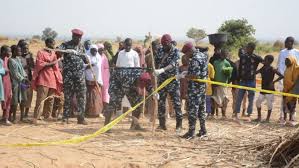Determined to reduce preventable maternal and infant deaths, the Lagos State Government has launched a renewed push to strengthen maternal healthcare delivery across the state. Through targeted interventions, upgraded health infrastructure, and coordinated action with development partners, the government aims to make pregnancy and childbirth safer for every woman in Lagos.
State Commissioner for Health, Prof. Akin Abayomi, said the Governor Babajide Sanwo-Olu-led administration is taking bold, data-driven steps to tackle the root causes of maternal and neonatal deaths and improve access to quality healthcare for mothers and children.
Speaking at the opening of a five-day Maternal and Neonatal Mortality Reduction Innovation Initiative (MAMII) Activation Workshop at Protea Hotel, Alausa, Abayomi explained that Lagos has strengthened its Primary Health Centres (PHCs) and is upgrading 47 facilities as part of a broader plan to enhance maternal and newborn services.
According to the commissioner, “Every mother deserves a safe birth, and every newborn deserves a healthy start to life.” He emphasized that reducing maternal and infant deaths is not just a health target but a moral duty that demands collective responsibility.
The MAMII workshop, organised by the Federal Ministry of Health and Social Welfare in collaboration with the Lagos State Ministry of Health and development partners, aims to design a coordinated framework to curb preventable maternal and infant deaths.
The initiative integrates primary healthcare, health insurance, and emergency response systems, making communities active stakeholders in improving outcomes.
Unveiled in November 2024, MAMII targets 172 local government areas across 33 states, with the goal of cutting maternal mortality and strengthening Nigeria’s healthcare system. The country currently records an alarming maternal mortality rate of 512 deaths per 100,000 live births.
Abayomi said Lagos remains deeply concerned about the persistent burden of maternal and infant deaths and is committed to addressing local drivers of the problem. Despite being one of Nigeria’s most advanced states, he noted, Lagos faces unique challenges due to its dense population and constant influx of new residents.
“The moment you cross into Lagos, you become the responsibility of the government, and if you have a health issue, you become my responsibility,” he said, reiterating the administration’s commitment to inclusive and equitable healthcare.
The commissioner added that Lagos is analysing health data to identify gaps and trends, ensuring evidence-based planning and equitable distribution of services. He noted that beyond infrastructure, health financing remains a major focus, with the government making health insurance mandatory for all residents through an executive order domesticating the National Health Insurance Authority Act.
He revealed that, in addition to upgrading 47 of its 327 PHCs, the state is addressing ward-level inequalities and expanding its health workforce through the proposed University of Medicine and Health Sciences, which is projected to produce up to 3,000 health professionals annually within five years.
Also speaking, Special Adviser to the Governor on Health, Kemi Ogunyemi, described maternal and child mortality as a critical public health concern that demands sustained and coordinated effort. “Lagos currently ranks third in maternal and infant deaths nationally, but this is not a ranking we are proud of,” she said, adding that the daily influx of over 3,000 new residents continues to stretch the state’s healthcare capacity.
Ogunyemi called for stronger partnerships, improved data systems, and better nutrition programmes, noting that malnutrition is a silent but major contributor to child mortality. She said the state is leveraging its six health districts to decentralise healthcare management and accountability, while collaborating with private sector partners and NGOs under the T.H.E.M.E.S+ Agenda, which prioritises health and environment.
On his part, the National MAMII Lead, Dr. Dayo Adeyanju, said the initiative forms part of Nigeria’s National Health Sector Renewal Investment Initiative, targeting a 30% reduction in maternal deaths and a 60% increase in facility-based deliveries in high-burden areas by 2030. He explained that MAMII focuses on addressing delays in maternal care, improving service quality, and fostering cross-sector collaboration supported by data-driven decision-making.
Also speaking, Associate Professor of Neonatology and Lagos State Focal Person for the Nigerian Society of Neonatal Medicine, Dr. Beatrice Ezenwa, outlined key newborn health interventions, including essential newborn care, Special Care Baby Unit upgrades, digital health training, and integration of neonatal indicators into national health data systems. She noted that neonatal deaths account for 37% of under-five mortality in Nigeria, and that MAMII seeks to reverse this through coordinated, evidence-based action.
In her goodwill message, Technical Officer for Newborn, Child, and Adolescent Health at the World Health Organisation (WHO), Dr. Joy Ufere, reaffirmed the organisation’s commitment to supporting Lagos in achieving significant reductions in maternal and infant deaths, commending the state’s proactive and collaborative approach.



